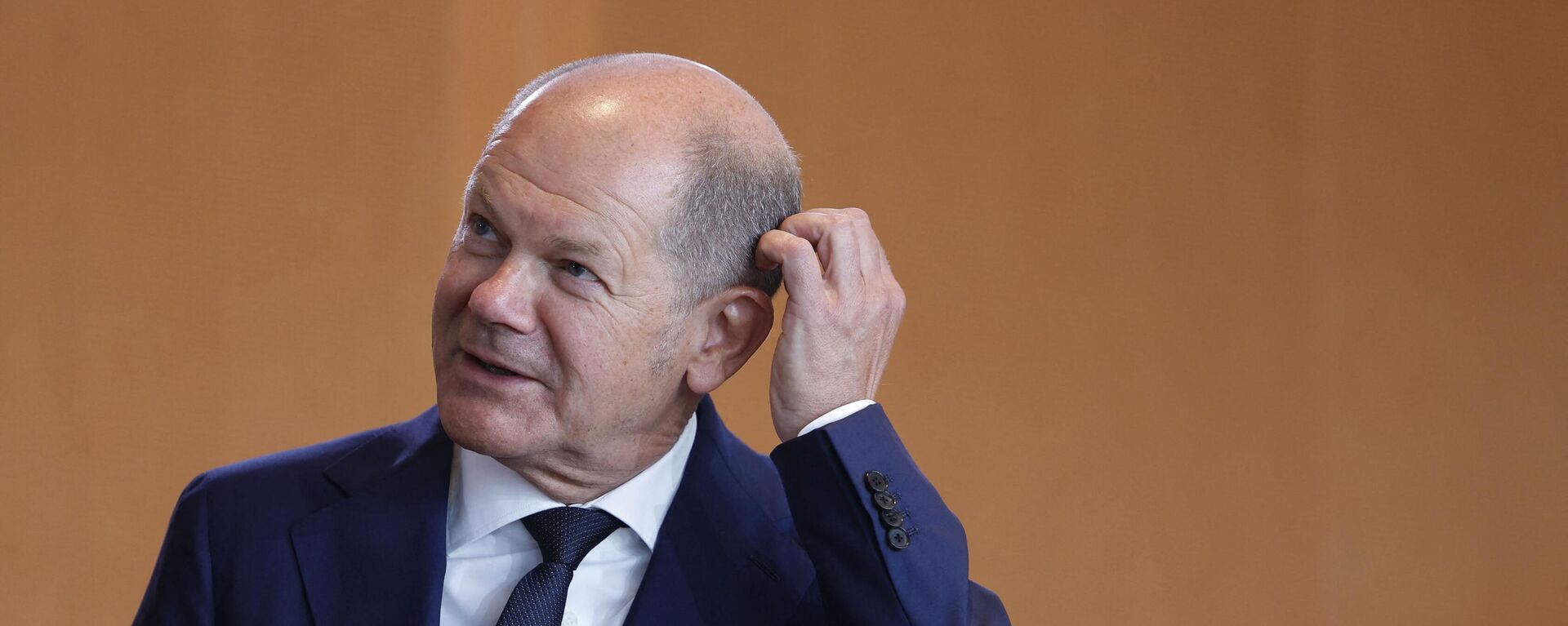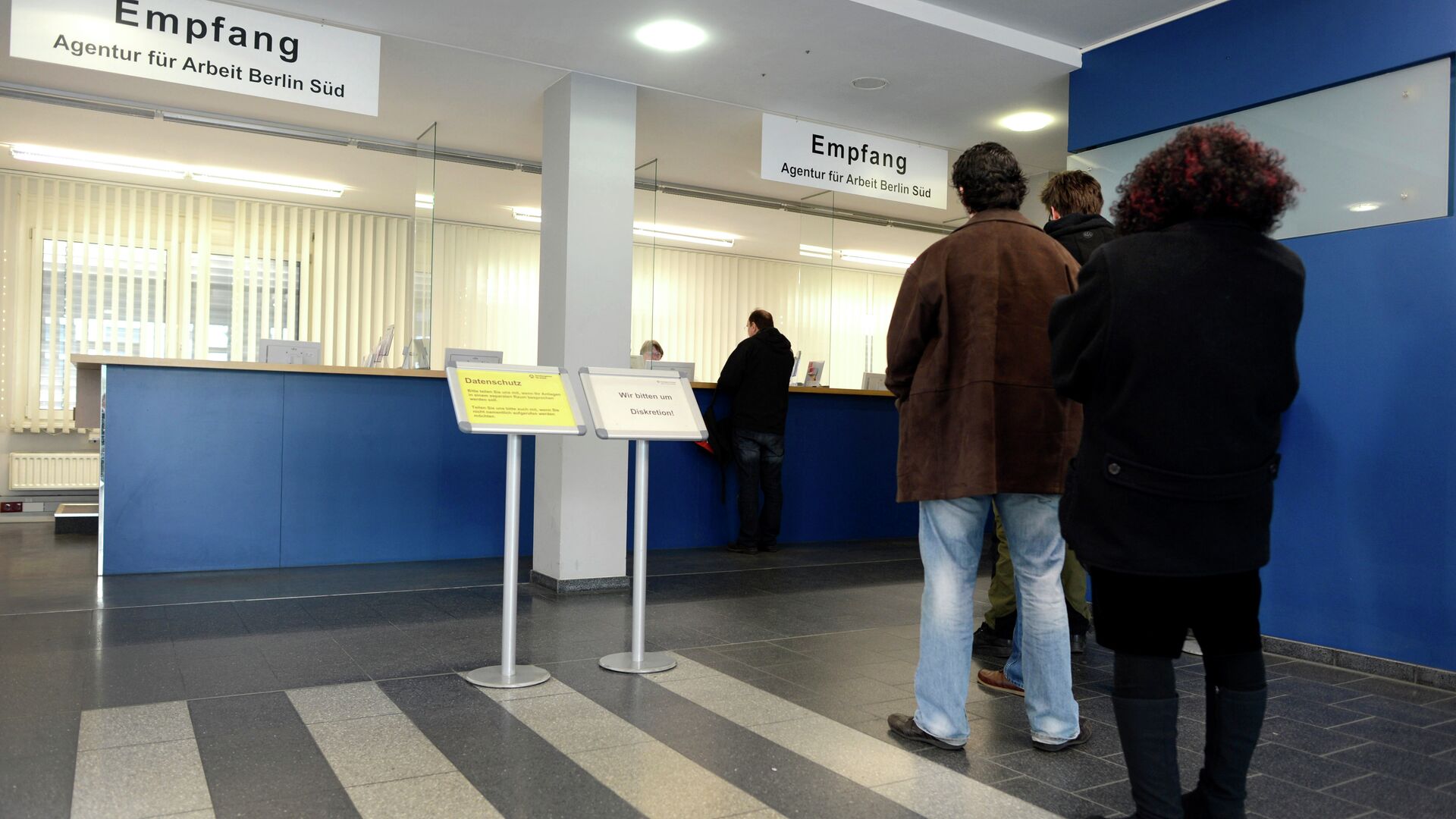https://sputnikglobe.com/20231130/germanys-jobless-rate-peaks-at-59-record-high-in-years-1115301550.html
Germany's Jobless Rate Peaks at 5.9%, Record High in Years
Germany's Jobless Rate Peaks at 5.9%, Record High in Years
Sputnik International
In a not-so-stunning twist, the German workforce downturn highlights persistent economic woes. As a potential recession haunts the nation amid budgetary limbo, exacerbated by energy crises and accelerating deindustrialization, the future remains gloomy for the Olaf Scholz led government.
2023-11-30T13:30+0000
2023-11-30T13:30+0000
2023-11-30T13:30+0000
world
europe
business
andrea nahles
olaf scholz
christine lagarde
berlin
russia
germany
bundesbank
https://cdn1.img.sputnikglobe.com/img/102362/98/1023629864_0:177:4791:2872_1920x0_80_0_0_871cc23d51730ceb258813c10b6236da.jpg
Germany's economic frailty is now actually starting to pinch the employment sector where it hurts the most. The country's joblessness rate has climbed to its highest peak in two and a half years. The Federal Labor Agency disclosed that the rate reached 5.9 percent in November, an increase from 5.8 percent in the prior month. This uptick slightly surpassed economists' predictions, with those unemployed rising by 22,000.The employment crisis in Germany experienced a significant surge over the past year, with a decline in job openings in October. This troubling trend indicates that Europe's economic powerhouse is facing serious cracks in the employment sector as the economy decelerates. Germany's joblessness rate has been steadily climbing, reaching 5.7 percent in September and 5.8 percent in October, the highest since June 2021. Andrea Nahles, the head of Germany's Federal Labor Agency, has noted that job growth is barely noticeable and the demand for labor is dwindling.Despite these hurdles, the job market has continued to be a crucial aspect of the economy as it tries to recover from last winter's self-inflicted energy crisis by sanctioning cost-effective gas from Russia.The economy shrank in the third quarter of 2023, and the Bundesbank suggests Germany might be experiencing a recession. Alarmingly, a severe scarcity of skilled workers is causing half of the companies in the country to face difficulties in filling job vacancies, a situation that could lead to a 2-percent GDP loss, as estimated by the DIHK Chambers of Industry and Commerce.Germany's economic recovery faces additional risks from fiscal uncertainties, exacerbated by a recent court decision barring the Scholz government from repurposing pandemic-era funds. Christine Lagarde, President of the European Central Bank, and Joachim Nagel, the Bundesbank's president, have emphasized the need for Berlin to address these budgetary issues promptly. Enzo Weber, the research head at the Institute for Employment Research in Nuremberg, noted an uptick in layoffs due to the prior year’s energy price surge.The federal employment agency in Germany documented a seasonally adjusted increment of 30,000 unemployed people from October, elevating the total to 2.61 million, an increase of 165,000 from the prior year. This rise in unemployment followed the arrival of over 1 million Ukrainian refugees, contributing 0.4 percentage points to the unemployment rate.Despite labor shortages highlighted by 43 percent of firms in a July 2023 survey by Munich's Ifo Institute, the number of job vacancies has decreased. In October, available positions dropped to 749,000, a reduction of 12,000 from the preceding month and 98,000 from the previous year. Germany’s Economy Minister Robert Habeck underscored the critical need for skilled immigrants to support the aging workforce and address these pressing labor shortages, which he attributes to the projected 0.4 percent contraction in the German economy this year.Federal Labor Agency Director Andrea Nahles stated that the prolonged economic stagnation, stretching back to last winter, inevitably affects the labor market. However, she added that the job market is comparatively resilient in light of the economic data.
https://sputnikglobe.com/20231128/scholzs-recovery-plan-made-bundestag-burst-with-laughter-dubbing-him-plumber-of-power-1115256083.html
berlin
russia
germany
Sputnik International
feedback@sputniknews.com
+74956456601
MIA „Rossiya Segodnya“
2023
Chimauchem Nwosu
https://cdn1.img.sputnikglobe.com/img/07e7/09/01/1113046371_0:99:1536:1635_100x100_80_0_0_9c5c627283eca931c39fe4852bbb301c.jpg
Chimauchem Nwosu
https://cdn1.img.sputnikglobe.com/img/07e7/09/01/1113046371_0:99:1536:1635_100x100_80_0_0_9c5c627283eca931c39fe4852bbb301c.jpg
News
en_EN
Sputnik International
feedback@sputniknews.com
+74956456601
MIA „Rossiya Segodnya“
Sputnik International
feedback@sputniknews.com
+74956456601
MIA „Rossiya Segodnya“
Chimauchem Nwosu
https://cdn1.img.sputnikglobe.com/img/07e7/09/01/1113046371_0:99:1536:1635_100x100_80_0_0_9c5c627283eca931c39fe4852bbb301c.jpg
germany, unemployment rate, economic frailty, germany's employment sector, federal labor agency, joblessness, europe, economic titan, employment sector, germany's economic deceleration, andrea nahles, job growth, labor demand, energy crisis, russia, bundesbank, recession, skilled workers, gdp loss, dihk chambers of industry and commerce, fiscal uncertainties, scholz government, pandemic funds, christine lagarde, european central bank, joachim nagel, enzo weber, institute for employment research, layoffs, ukrainian refugees, ifo institute, munich, job vacancies, robert habeck, skilled immigrants, aging workforce, economic stagnation.
germany, unemployment rate, economic frailty, germany's employment sector, federal labor agency, joblessness, europe, economic titan, employment sector, germany's economic deceleration, andrea nahles, job growth, labor demand, energy crisis, russia, bundesbank, recession, skilled workers, gdp loss, dihk chambers of industry and commerce, fiscal uncertainties, scholz government, pandemic funds, christine lagarde, european central bank, joachim nagel, enzo weber, institute for employment research, layoffs, ukrainian refugees, ifo institute, munich, job vacancies, robert habeck, skilled immigrants, aging workforce, economic stagnation.
Germany's Jobless Rate Peaks at 5.9%, Record High in Years
In a not-so-stunning twist, the recent downturn in the German workforce highlights the persistent economic woes. With the specter of a recession looming and the government grappling with budgetary uncertainty, worsened by energy crises and the rapid decline of industrialization, the future remains gloomy for the Olaf Scholz led government.
Germany's economic frailty is now actually starting to pinch the employment sector where it hurts the most. The country's joblessness rate has climbed to its highest peak in two and a half years. The Federal Labor Agency disclosed that the rate reached 5.9 percent in November, an increase from 5.8 percent in the prior month. This uptick slightly surpassed economists' predictions, with those
unemployed rising by 22,000. The employment crisis in Germany experienced a significant surge over the past year, with a decline in job openings in October. This troubling trend indicates that Europe's economic powerhouse is facing serious cracks in the employment sector as the economy decelerates. Germany's joblessness rate has been steadily climbing, reaching 5.7 percent in September and 5.8 percent in October, the highest since June 2021. Andrea Nahles, the head of Germany's Federal Labor Agency, has noted that job growth is barely noticeable and the demand for labor is dwindling.

28 November 2023, 15:36 GMT
Despite these hurdles, the job market has continued to be a crucial aspect of the economy as it tries to recover from last winter's self-inflicted energy crisis by sanctioning cost-effective gas from Russia.
The economy shrank in the third quarter of 2023, and the Bundesbank suggests Germany might be
experiencing a recession. Alarmingly, a severe scarcity of skilled workers is causing half of the companies in the country to face difficulties in filling job vacancies, a situation that could lead to a 2-percent GDP loss, as estimated by the DIHK Chambers of Industry and Commerce.
Germany's economic recovery faces additional risks from fiscal uncertainties, exacerbated by a
recent court decision barring the Scholz government from repurposing pandemic-era funds. Christine Lagarde, President of the European Central Bank, and Joachim Nagel, the Bundesbank's president, have emphasized the need for Berlin to address these budgetary issues promptly. Enzo Weber, the research head at the Institute for Employment Research in Nuremberg, noted an uptick in layoffs due to the prior
year’s energy price surge.
The federal employment agency in Germany
documented a seasonally adjusted increment of 30,000 unemployed people from October, elevating the total to 2.61 million, an increase of 165,000 from the prior year. This rise in unemployment followed the
arrival of over 1 million Ukrainian refugees, contributing 0.4 percentage points to the unemployment rate.
Despite labor shortages highlighted by 43 percent of firms in a July 2023 survey by Munich's Ifo Institute, the number of job vacancies has decreased. In October, available positions dropped to 749,000, a reduction of 12,000 from the preceding month and 98,000 from the previous year. Germany’s Economy Minister Robert Habeck underscored the
critical need for skilled immigrants to support the aging workforce and address these pressing labor shortages, which he attributes to the projected 0.4 percent contraction in the German economy this year.
Federal Labor Agency Director Andrea Nahles stated that the prolonged economic stagnation, stretching back to last winter, inevitably affects the labor market. However, she added that the job market is comparatively resilient in light of the economic data.




